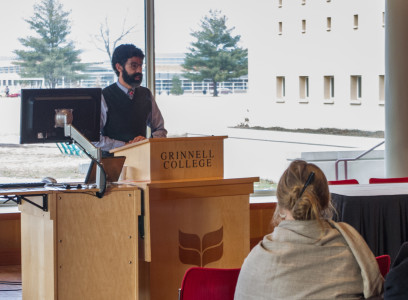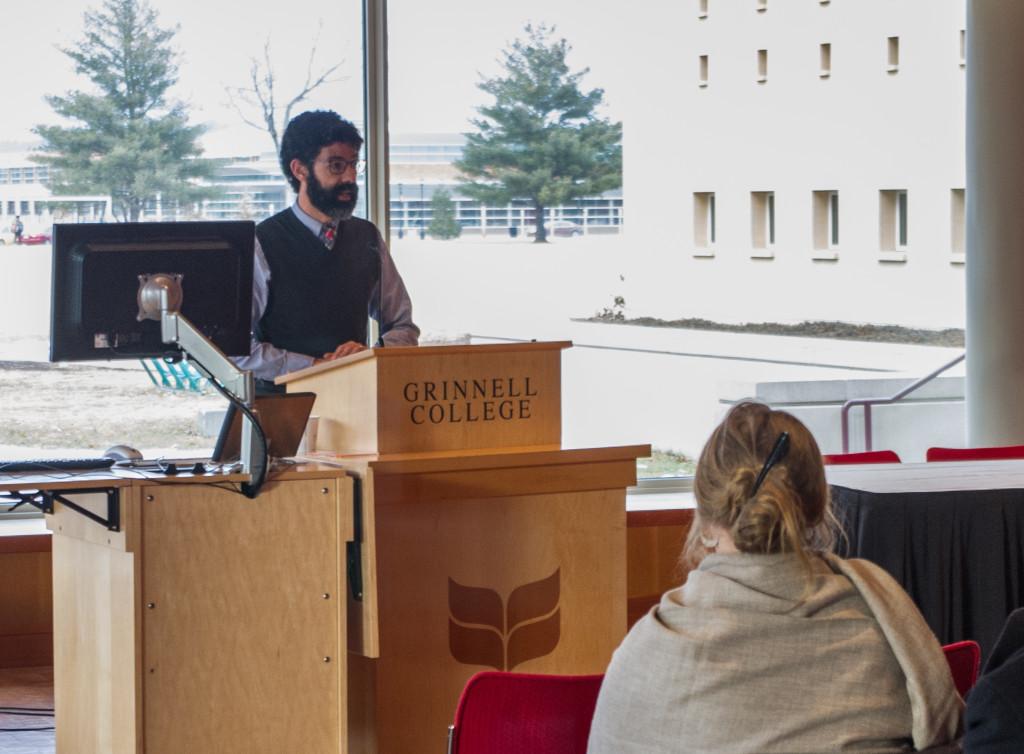After a recent Senate vote declaring that “climate change is real and not a hoax” by a margin of 98-1, there has been a renewed focus on the challenge of approaching and confronting the controversial subject. This made timely the lecture of Dr. Evan Berry, assistant professor of Philosophy and Religion at American University, on the subject of climate change and religious globalization particularly, as he discussed the variety of religious responses to the matter of the changing climate.
The Gates Lecture Series and the Religious Studies Department worked together to organize Berry’s lecture, which was hosted on Tuesday afternoon in JRC 101.
Berry holds a Ph.D. in religious studies from the University of California, Santa Barbara and conducts research focusing on the intersection of religion and the environment. “Devoted to Nature: The Religious Roots of American Environmentalism,” a book based on his body of research, is forthcoming.

Photo by Jeff Li
Caleb Elfenbein, History and Religious Studies, explained that Berry’s work is particularly pressing and sheds new light on a well-worn subject.
“Climate change is an issue of concern far beyond the scholarly boundaries of religious studies, yet as Berry’s work shows it is also an area of inquiry that is of increasing importance to scholars in the field as well as the religious communities that scholars study and engage with,” Elfenbein wrote in an email to The S&B. “Moreover, climate change is an area that is especially given to interdisciplinary work, touching on areas of investigation related to science and scientific discourse as well as social and cultural questions.”
After Elfenbein’s introduction, Berry dove into an explanation of the complicated political landscape that religious authorities must navigate and the socio-cultural ramifications of religious environmentalism.
“People have begun to grapple with current harms in the present moment, as opposed to future harms,” Berry said. “2014 was the warmest year in recorded history.”
He proceeded to cover the oft-noted effects of climate change, such as the acidification of the oceans and the increased risk of typhoons, adding that humanity’s collective knowledge of “this condition” is growing, mostly due to an increased awareness of globalization.
“In short, climate change exemplifies many of the key characteristics of globalization,” he said.
In his following presentation slides, Berry argued that globalization has protected the interests of the wealthy and powerful, and that climate change reflects the “resource extraction economies of the global world order.”
He then detailed his own research, explaining that the effects of globalization meant a greater rate of exchange and communication among the world’s peoples, which naturally resulted in a focus on ecological issues and environmental questions strongly imbued with the moral norms that preside over them. Berry noted that this is where his studies on moral norms and sacred institutions came in, for the purpose of addressing two questions: how does climate change impact religious life, and how are religious actors bringing their systems to bear on climate change?
Berry answered that religious groups have adapted to climate change in order to preserve themselves, and in the process of doing so they have brought together the language of social justice, their own relationships with political decision-makers and the ability to mobilize constituents and politically salient groups.
“Religious groups can either buttress or contravene the interests of governments, they can advance or resist democratization and they can act either as a legitimating or counter-homogenizing force,” he explained.
As Berry was taking questions, an audience member asked about the advantages that religious organizations have over secular NGOs. Berry explained that religious groups have really good infrastructure, which a secular NGO may not have.
Elfenbein wrote that he hopes attendees will take what they learned in Berry’s lecture and consider new insights into the discussion on climate change.
“[We] hope that people who attend the evening panel will gain an appreciation of the simultaneously local and global nature of climate change and the ways that different communities grapple with its implications,” he wrote.





























































